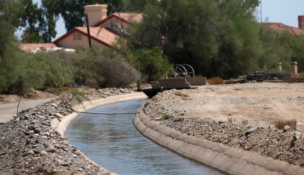Gov. tells lawmakers to focus on future, not budget cuts
Arizona Capitol Reports Staff//January 18, 2008//[read_meter]
Gov. tells lawmakers to focus on future, not budget cuts
Arizona Capitol Reports Staff//January 18, 2008//[read_meter]
Gov. Janet Napolitano kicked off the 2008 legislative session Jan. 14 by reaffirming her commitment to the state’s schools, proposing spending more money on education programs – including one that would provide free tuition to state universities and community colleges for all high school students who stay out of trouble and graduate with a B-average or better.
In her annual State of the State speech, Napolitano urged lawmakers to consider greater investments in education and health care, even as the state grapples with an estimated $1 billion budget deficit. Her speech included five focal points: education, economic development, safety and security, transportation and growth, and health care.
“Our state is strong,” she said. “And together we are writing the story of its future.”
She warned legislators not to cut programs haphazardly as a reaction to sour economic forecasts.
“Let me tell you a few things that this budget shortfall is not,” she said. “It is not permanent. It is not a sign that Arizona's growth will stall, or that this wonderful place we call home will become less desirable. More important, it is not an excuse to stop working toward what we all believe in.”
Republican leaders said in a press conference the speech was full of “bold ideas” but short on specifics.
“What’s lacking right now is just the details,” House Speaker Jim Weiers said. “Those details will have to, obviously, come out with her budget.”
However, both Weiers and Senate President Tim Bee said they were open to the ideas Napolitano proposed in her annual speech and would be willing to look at them more closely when the governor releases her budget proposal later this week.
“You have never heard me say ‘no’ to anything that is suggested,” Weiers said.
Most notably, the governor set a goal of making sure today's eighth-graders will be assured free tuition if they meet a specific threshold during high school. So, that means funding must be in place by 2012.
Democrats greeted Napolitano's announcement of the tuition program with a round of applause, while Republicans were noticeably less enthusiastic.
Weiers said that was an admirable goal, but he questioned how much it would cost the state to do, especially in light of the current $1 billion deficit.
“There’s obviously going to be a cost,” he said. “The cost has to come from somewhere.”
Napolitano also proposed setting fixed tuition rates for students so that they aren't hit with unexpected increases after they’ve started their course work.
Bee said he would support such a move, which was originally proposed by a Republican senator several years ago. “It’s a good idea and one we should move forward on,” he said.
Napolitano called education “Chapter One,” using it to transition to “Chapter Two” – economic development.
“Our education system is linked to the needs of Arizona’s economic future,” she said. “There is no separation.”
State funding for grant-based research has helped Arizona remain competitive in high-tech industries, Napolitano said. She pointed toward the state’s $25 million investment in the Science Foundation Arizona and the $25 million in matching private donations as an example of the type of allocations she would like to see in the coming budget year.
Napolitano also took on what she called the “sub-prime lending debacle.” She described a three-point plan to address problems in Arizona’s mortgage industry:
• The Department of Real Estate has created the Homebuyers’ Bill of Rights, which gives potential homebuyers information about roads, water, police and fire services and assists in making financial decisions. It is available online.
• Pass legislation to require equity purchasers to be licensed by the state. The Arizona Home Equity Theft Protection Act would keep predatory lenders from preying on vulnerable homebuyers.
• Require loan officers to be state licensed. If unethical behavior occurs, the license could be revoked.
As for employer sanctions, Napolitano urged legislators to provide more money to enforce the state’s new law that punishes businesses that hire illegal immigrants. She said money needs to be redirected in order to address the challenges facing law enforcement.
“Too often lately, we see this money go for TV commercials that amount to little more than publicity for an elected official. That’s the wrong way to use it,” she said. “Pass a bill that uses the money for core functions of law enforcement – like body armor and investigators; then dedicate a part of that money to enforce the employer sanctions law.
“In a tight budget year, this is efficient, and ensures that the money is used responsibly and effectively.”
The governor's budget proposal includes $1.4 million to operate the Arizona Counter Terrorism Intelligence Center to make up for money lost when the federal government slashed funding for the center.
Once again, Napolitano pushed lawmakers to increase the high-school dropout age to 18 from 16, and to allow greater access to health-care insurance. Children, in particular, she said, deserve a healthy start.
“These young people should be able to maintain the health care they’ve grown up with,” she said. “I have directed the Department of Administration to find ways for the state health insurance plan to allow all young adults – up to the age of 25 – to continue coverage on their parents’ insurance, so long as this can be done in a way that is cost-neutral to taxpayers.”
She concluded the speech with an impassioned statement urging lawmakers to focus on improving the state’s core services and programs rather than reacting to the immediate budget crisis. She once again called on them to improve transportation and other services by spending money in the state’s Rainy Day fund, essentially a stockpile of money intended for emergencies.
“We must remember that Arizonans years from now won’t ask how we balanced the budget,” she said. “Instead, they’ll ask how we improved education, ensured their safety, built a prosperous economy and planned for explosive growth.”
But that doesn’t detract from the reality of the situation, Weiers said, noting that while Arizona is strong, its economy is weak at the moment.
“Things are slowing down. It’s just a fact of life,” he said.
















